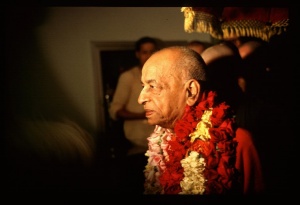CC Adi 4.30 (1975)

A.C. Bhaktivedanta Swami Prabhupada
TEXT 30
- āmiha nā jāni tāhā, nā jāne gopī-gaṇa
- duṅhāra rūpa-guṇe duṅhāra nitya hare mana
SYNONYMS
āmiha—I; nā jāni—shall not know; tāhā—that; nā jāne—will not know; gopī-gaṇa—the gopīs; duṅhāra—of the two; rūpa-guṇe—the beauty and qualities; duṅhāra—of the two; nitya—always; hare—carry away; mana—the minds.
TRANSLATION
"Neither the gopīs nor I shall notice this, for our minds will always be entranced by one another's beauty and qualities.
PURPORT
In the spiritual sky the Vaikuṇṭha planets are predominated by Nārāyaṇa. His devotees have the same features He does, and the exchange of devotion there is on the platform of reverence. But above all these Vaikuṇṭha planets is Goloka, or Kṛṣṇaloka, where the original Personality of Godhead, Kṛṣṇa, fully manifests His pleasure potency in free loving affairs. Since the devotees in the material world know almost nothing about these affairs, the Lord desires to show these affairs to them.
In Goloka Vṛndāvana there is an exchange of love known as parakīya-rasa. It is something like the attraction of a married woman for a man other than her husband. In the material world this sort of relationship is most abominable because it is a perverted reflection of the parakīya-rasa in the spiritual world, where it is the highest kind of loving affair. Such feelings between the devotee and the Lord are presented by the influence of yogamāyā. The Bhagavad-gītā states that devotees of the highest grade are under the care of daiva-māyā, or yogamāyā: mahātmānas tu māṁ pārtha daivīṁ prakṛtim āśritāḥ (BG 9.13). Those who are actually great souls (mahātmās) are fully absorbed in Kṛṣṇa consciousness, always engaged in the service of the Lord. They are under the care of daivī-prakṛti, or yogamāyā. Yogamāyā creates a situation in which the devotee is prepared to transgress all regulative principles simply to love Kṛṣṇa. A devotee naturally does not like to transgress the laws of reverence for the Supreme Personality of Godhead, but by the influence of yogamāyā he is prepared to do anything to love the Supreme Lord better.
Those under the spell of the material energy cannot at all appreciate the activities of yogamāyā, for a conditioned soul can hardly understand the pure reciprocation between the Lord and His devotee. But by executing devotional service under the regulative principles, one can become very highly elevated and then begin to appreciate the dealings of pure love under the management of yogamāyā.
In the spiritual loving sentiment induced by the yogamāyā potency, both Lord Śrī Kṛṣṇa and the damsels of Vraja forget themselves in spiritual rapture. By the influence of such forgetfulness, the attractive beauty of the gopīs plays a prominent part in the transcendental satisfaction of the Lord, who has nothing to do with mundane sex. Because spiritual love of Godhead is above everything mundane, the gopīs superficially seem to transgress the codes of mundane morality. This perpetually puzzles mundane moralists. Therefore yogamāyā acts to cover the Lord and His pastimes from the eyes of mundaners, as confirmed in the Bhagavad-gītā (BG 7.25), where the Lord says that He reserves the right of not being exposed to everyone.
The acts of yogamāyā make it possible for the Lord and the gopīs, in loving ecstasy, to sometimes meet and sometimes separate. These transcendental loving affairs of the Lord are unimaginable to empiricists involved in the impersonal feature of the Absolute Truth. Therefore the Lord Himself appears before the mundaners to bestow upon them the highest form of spiritual realization and also personally relish its essence. The Lord is so merciful that He Himself descends to take the fallen souls back home to the kingdom of Godhead, where the erotic principles of Godhead are eternally relished in their real form, distinct from the perverted sexual love so much adored and indulged in by the fallen souls in their diseased condition. The reason the Lord displays the rāsa-līlā is essentially to induce all the fallen souls to give up their diseased morality and religiosity, and to attract them to the kingdom of God to enjoy the reality. A person who actually understands what the rāsa-līlā is will certainly hate to indulge in mundane sex life. For the realized soul, hearing the Lord's rāsa-līlā through the proper channel will result in complete abstinence from material sexual pleasure.